Search
Showing 10 of 1803 results for NARSC 2016 July student registration fees
-
NZ EdTech breaks into Middle East market with ‘Play Code Learn’ teaching solution
ByteEd is a New Zealand EdTech company with a mission to empower future generations to become creators of technology rather than just users. The company started out in 2018 by teaching industry-standard programming to high school and university students to create virtual reality worlds. However, a need to start reaching a younger audience was identified due to a lack of foundational concepts.
This led Founder and CE, Peter Dong and his team, to develop a comprehensive solution for students in their early years, using ‘Play Code Learn’ hands on kits combined with augmented reality and artificial intelligence to address this gap.
It is this solution that has been adopted as a core resource by Higher Colleges of Technology (HCT) in the United Arab Emirates for its new Computational Thinking course. All Emirati graduates from their six colleges will learn computational thinking and then using the Play Code Learn resource will teach this in schools where they will become teachers.
Dr Robert Miles and Haya Al Nuaimi undertaking training on the Play Code Learn kits at HCT Ras Al Khaimah
Peter says that getting to this point has been the culmination of several years of hard work and relationship building, with patience and persistence being key to their success.
“We went into this process knowing that it would take time. We started with a real understanding of our customers’ needs and in particular those of HCT. HCT is a large organisation and we needed to build relationships with multiple key decision makers.
“We are so excited to have made this breakthrough into the UAE and hope it paves the way for more New Zealand EdTechs to do the same;” said Peter.
“As more educators at HCT in the UAE use our solution and collaborate with ByTeEd, then we’ll be building New Zealand’s reputation for our country’s capability in developing innovative and valuable EdTech solutions,” he added.
A student using augmented reality to program while the physical learning kit can be seen in the background.
The opportunity to work with HCT all came about from an introduction that was facilitated by Education New Zealand Manapou ki te Ao (ENZ) at the New Zealand Pavilion at the Dubai World Expo in early 2022. Several New Zealand EdTech companies were invited to be part alongside other New Zealand education providers.
Dr Angela Fitzgerald, Executive Dean – Faculty of Education at HCT commented that the work that her Faculty was doing with ByteEd is powerful.
“Their approach empowers teacher educators through lived experiences of computational thinking to prepare future teachers in equally dynamic ways to equip young children with these very skills and knowledge. This will be necessary as they navigate their future worlds,” said Dr Fitzgerald.
Lecturer Jennifer Filinuk and Senior Lecturer Savita Parashar are using the hands-on learning tools to learn computational thinking before combining it with augmented reality.
When asked what advice ByteEd would give to a fellow EdTech looking to expand their business overseas, and specifically into the Gulf Cooperation Council countries, Peter had some nuggets of advice.
He said that taking the first step to explore the market and gauge interest from target customers is key to gaining that initial understanding of the potential, as is gaining a clear understanding of the problem that you’re aiming to solve for this market.
“Show that you’re not just another visitor and be prepared to make multiple visits and build relationships.
“There are many opportunities in the Gulf region for New Zealand EdTech companies, with more funding available here due to a strong focus on education. The region is also one of few where the younger population is growing,” said Peter.
“There is also significant competition in this region however, so make sure to research potential competitors and consider how to position your company and product effectively”, he concluded.
For more information
ENZ, alongside EdTechNZ, recently hosted a Middle East EdTEch market deep dive with a presentation delivered by Nick Sheppard, Trade and Commercial Advisor from New Zealand Trade and Enterprise based in Dubai. Joining him in the session were the Founders of New Zealand EdTech’s ByteEd, Komodo Wellbeing and EDconnect. You can watch a recording of the presentation here with the slides available here.
If you have further questions about the support that ENZ can provide New Zealand EdTechs overseas, please contact ENZ’s Business Development Manager, Alana Pellow – alana.pellow@enz.govt.nz.
-
Tune in for more useful insights from the ENZ Insights team!
On Wednesday 4 December, our Minister of Tertiary Education and Skills, Hon Penny Simmonds, released the interim 2024 enrolment figures. These numbers are used to assess the state of the New Zealand international education sector.
ENZ’s Insights team have been going through the numbers and our Director of Insights, Marie Clark, is holding a webinar on Thursday 12th December from 2.30-3.30pm. Tune in as Marie will take you through the data including total enrolment numbers by subsector, highlight emerging trends and will offer advice on how this information can be used in your planning.
Register for this webinar here.
Also coming up over summer....
Join us to hear more about the state of New Zealand’s education brand overseas
Our latest brand health research was conducted in October, and we’re pleased to say that the results are looking good! ENZ will be hosting another webinar on Wednesday 29 January at 10:30am NZT and invites the sector to come and hear about:
-
International student considerers’ perceptions of New Zealand as an international education destination
-
New Zealand’s competitiveness compared to other key international education destinations
-
How perceptions and competitiveness of a New Zealand education has changed over time.
-
The drivers and barriers to international study, and study with New Zealand
-
How findings are being put into action
You can register for this session here.
Both sessions will be recorded and available, along with the Brand Tracking Report on Intellilab following the webinars.
-
-
Winners of KIWI Challenge announced
This year was the first where university students were able to enter a new category alongside the schools' challenge.
The winning teams from Petra Christian University and USG Education headed off strong competition from eight other finalists, drawing praise from the judges for their solutions to support youth-led Small and Medium Enterprises (SMEs).
Finalists presented to a panel of judges from University of Otago – Ōtākou Whakaihu Waka and Education New Zealand Manapou ki te Ao (ENZ), who were cohosting the initiative.
Both winning teams received a voucher valued at 10,000,000 Indonesian Rupiah (approximately 1,000NZD) as well as virtual internships from the University of Otago – Ōtākou Whakaihu Waka commencing in semester one, 2025.
Tech-led solutions
A team from Petra Christian University developed an app ‘Partify’ which connects emerging small businesses and keen part-time workers. Businesses post part-time jobs, and workers swipe to find flexible gigs nearby, with AI matching candidates based on skills, location, and availability.

Partify university winner – ENZ market manager Naluri Bella and University of Otago Regional Market Manager Sarah Ewing present the award for First Place in the University category to team members from Petra Christian University for their app ‘Partify’.
In the high school category, a team from USG Education took the top prize with ‘LAW4MSME’, a platform allowing small businesses to access legal information and advice.
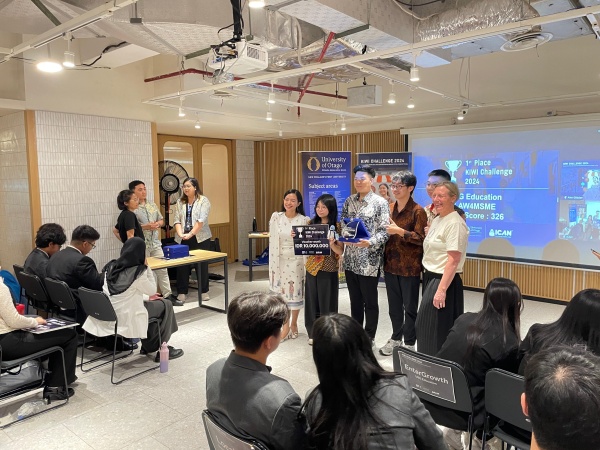
LAW4MSME High school winner - ENZ market manager Naluri Bella and University of Otago Regional Market Manager Sarah Ewing present the award for First Place in the University category to team members from USG Education for their platform “LAW4MSME’.
Explaining the group’s business idea, team leader for LAW4MSME, David Francis said the students found that Indonesian youth-led SMEs lack knowledge of the laws and regulations needed to run their businesses.
“To address this, we developed an AI bot that educates SME owners on these regulations, helping them navigate legal requirements more effectively,” David said.
The KIWI Challenge competition aims to inspire youth across Indonesia to engage in entrepreneurial activities and help resolve societal issues. Over the five years the competition has run, 1000 Indonesian youth have participated. This year, Education New Zealand Manapou ki te Ao (ENZ) partnered with University of Otago to co-host the initiative.
This year’s competition included 49 teams with a total of 221 student participants.
Mentorship key
Mentorship is a key element of the competition. The finalists attended a workshop run by Associate Professor Dr Conor O’Kane, Head of the Bachelor of Entrepreneurship programme at Otago Business School. This assisted entrants to develop their ideas and refine business plans.
ENZ Acting General Manager International Ben Burrowes said he’s delighted to see the continued development of the KIWI Challenge.
“Inviting university students for the first time has given us the opportunity to include a whole new cohort of talented young entrepreneurs, and we have been very impressed with the quality and creativity of their submissions,” Ben said.
“The competition has also benefitted from the enthusiasm and expertise of our colleagues at the University of Otago, and we are grateful for their willingness to partner with us for the KIWI challenge’s fifth year.”
Dr O’Kane said it was inspiring to witness the quality of entrepreneurial thinking among Indonesian students.
“These students have very bright futures. The concepts and programmes the finalists presented were remarkable and captured the impressive ability of the teams to identify tangible business problems and visualise and communicate a solution to these challenges,” Dr O’Kane said.
-
Growing visibility of New Zealand education in Latin America
From 12 -21 March, Education New Zealand Manapou ki te Ao (ENZ) held its first in-market, in-person roadshow in Latin America since before the Covid-19 pandemic. A total of 18 New Zealand education providers took part in the activities held in Colombia (Bogotá), Brazil (São Paulo), and Chile (Santiago), which brought together 143 representatives from 97 education agencies.
Representatives from institutions across New Zealand’s education sector (universities, English language schools, PTEs, and secondary schools) had the opportunity to network with agents and recruit students directly, strengthening connections with strategic partners and raising the profile of New Zealand in Colombia, Brazil, and Chile.
ENZ’s Director of Engagement for Latin America, Javiera Visedo, and Brazil Market Development Manager, Bruna de Natale, led the activities in all three countries. They provided full support to the New Zealand delegation, offering strategic information to maximise the professionals' time with Latin American partners, as well as sharing insights about the New Zealand institutions with local agents.
Through institutional presentations, one-on-one meetings with agents from the three countries, and collaborative discussion panels, where all shared best practices and ideas for continuing partnerships and New Zealand institutions were able to advance their business relationships with local partners.
This was also the perfect opportunity to launch the Spanish and Portuguese versions of ENZ’s Learn New Everyday marketing campaign, that was well received by agents as it provided them new assets and videos to use in local languages.
During the South America Roadshow, some New Zealand institutions also took part in parallel events in Bogotá and Santiago, organised by ENZ in collaboration with local partners. This included a student fair and a dedicated session with private and International Baccalaureate schools, reflecting the growing interest from students and families in pursuing undergraduate studies in New Zealand.

ENZ's Director of Engagement Latin America Javiera Visedo (pictured fourth from left, bottom row) and Coordinator Simone Cocco (to Javiera's right) with roadshow participants at one of the events in Bogota.
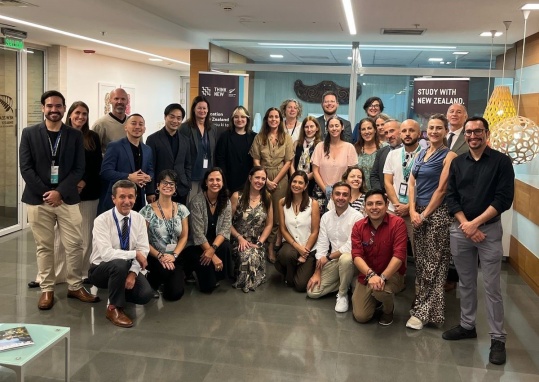
ENZ's Market Development Manager Bruna de Natale (pictured second from right, bottom row), Director of Engagement Latin America Javiera Visedo (pictured fifth from left, bottom row) and Coordinator Simone Cocco (pictured second from right, bottom row) with roadshow participants at one of the events in Santiago.
Director of Engagement Latin America, Javiera Visedo, said engagement between New Zealand institutions and the Latin America market advanced significantly during the roadshow.
“There is no substitute for the connections and momentum we build when we meet face-to-face, and the trusted relationships we build,” she said.
“Engagements like these are key to ensuring the sustainable growth of students from Chile, Colombia, and Brazil to New Zealand,” Javiera added.
Feedback from education sector participants was positive. Director of Mount Maunganui Language Centre, Geoff Butler, said he wouldn’t hesitate to get involved in these events again.
“Post-pandemic, we were keen to have official events to reconnect with these markets - the events didn’t disappoint,” he said.
“There were excellent opportunities throughout each event day to engage with agents not only at our desks, but informally too,” Geoff added.
If you’re a New Zealand education provider and are interested in learning more about the Latin America market, reach out to the team via email: latinamerica@enz.govt.nz.
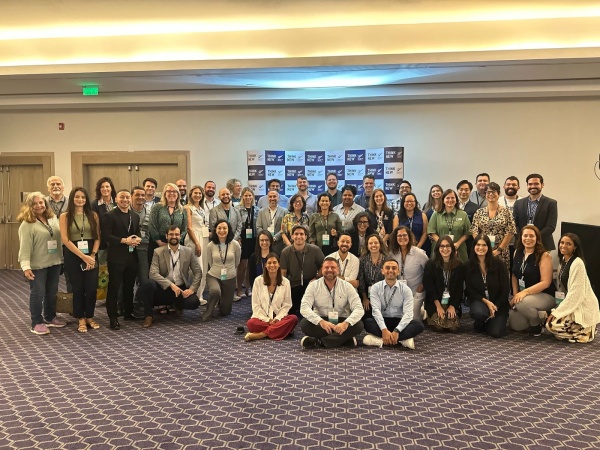
Attendees of the São Paulo ENZ agent event.
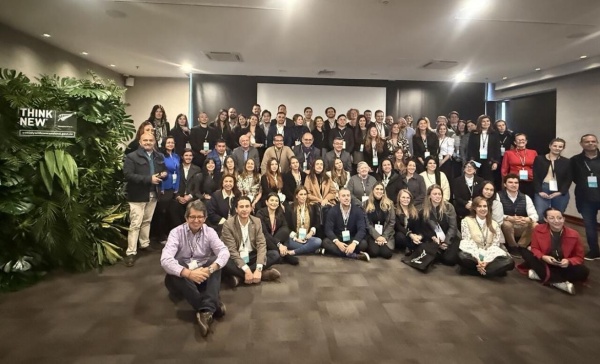
Attendees of the Bogotá ENZ agent event.
-
Positive outcomes for education from PM’s trade mission to India
Prime Minister Rt Hon Christopher Luxon led a high-level visit to India from 16–20 March, accompanied by one of the largest New Zealand delegations to date. The delegation included representatives from the business, community, media, and government sectors, along with a cultural delegation, Te Kapa Haka o Te Whānau-a-Apanui.
Education New Zealand Manapou ki te Ao (ENZ) Chief Executive Amanda Malu joined the trade mission as part of the education component of the delegation – alongside University of Auckland Vice Chancellor, Dawn Freshwater; Vice Chancellor, University of Waikato, Neil Quigley; Te Pūkenga/NZIST Chief Executive, Gus Gilmore and Whitecliffe College Executive Chairman, Feroz Ali.
The mission saw a number of key education initiatives announced that aim to strengthen New Zealand’s education ties with India, including the signing of the refreshed bilateral Education Cooperation Arrangement (ECA).
These initiatives mark a significant step forward in deepening New Zealand’s collaboration with India around joint research, student exchanges, academic innovation and fostering long-term institutional partnerships.
The original ECA was signed in 2010 with the objective of strengthening bilateral cooperation between New Zealand and India and fostering collaboration and the exchange of information on individual education systems.
The ECA refresh builds on this foundation and aims to foster further cooperation in education specifically through information exchange, collaboration between institutions, and sharing best practices in curriculum development, digital transformation, and sustainability.
A key education engagement during the mission was the ‘Shared Visions and Connected Futures’ event on 18 March, co-hosted by ENZ and New Zealand Centre partner IIT Delhi. Key education and government stakeholders were brought together to celebrate education, innovation, and the strong ties between New Zealand and India.
Six new memoranda of understanding (MOU) were signed on the day, with an additional four signed across other events and cities. The New Zealand Excellence Awards (NZEA) scholarships were officially launched by Prime Minister Luxon and ENZ Chief Executive Amanda Malu - this is a joint initiative between ENZ and all eight New Zealand universities offering a total of 29 scholarships valued at NZ $260,000.
An exclusive virtual internship programme was also launched – this initiative will provide opportunities for 30 IITD students to intern virtually with New Zealand organisations. The event also witnessed the announcement of the inaugural New Zealand Centre Innovation Fellowship which aims to enhance collaboration between New Zealand and India in innovation and entrepreneurship by providing a two-week immersive experience in India's innovation ecosystem.
The Prime Minister in a Fireside Chat with New Zealand alumni, Shirley Setia, University of Auckland alumni and Ashwani Batla, University of Waikato alumni.
To round off a packed programme, the Prime Minister hosted a "Fireside Chat” with celebrity alumni from University of Auckland and the University of Waikato, where they showcased their experiences studying and living in New Zealand.
ENZ Chief Executive Amanda Malu said the event was a testament to the strength of New Zealand’s educational relationship with India.
“India and New Zealand share a longstanding education relationship. Our collaborations bring enduring benefits to both nations. We look forward to continuing to work together to innovate, grow our skills and co-create education solutions for our future,” she said.
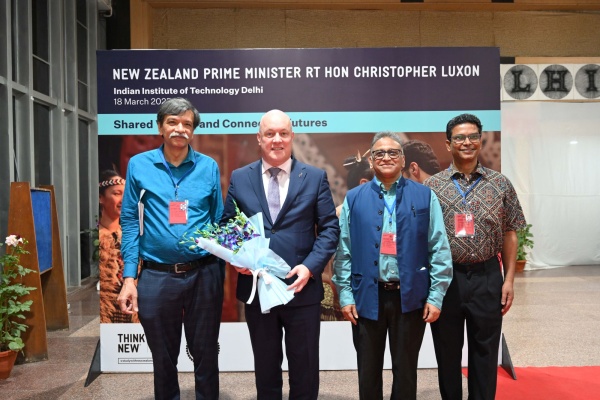
From L to R: Director of IIT Delhi, Professor Rangan Banerjee; the Prime Minister; Dean of Research and Development, Professor Naresh Bhatnagar; and Dean of International Programmes Professor James Gomes.
- Student stories
-
We want to hear from you!
This survey is important to gauge ENZ’s performance and importantly, hear from New Zealand international education providers on how we’re doing, what services you value and what you’d like to see more of.
Your feedback last year highlighted the value of ENZ’s branding and promotional work and offshore connections, and you wanted more data and insights to assist planning.
Since the launch of Learn New Every Day, our marketing campaign, and through optimising our media spend, we have driven significantly improved reach of New Zealand’s position as an education destination and engagement through content and connection.
Importantly, focus lies in building awareness, reputation and quality associations and ahead, we will be connecting with you to establish more effective partnership ways to amplify our joint promotional work.
ENZ underwent an organisational change process early in the new year, with the creation of the International & Sector Engagement team, which has a stronger focus on international services, with the aim of ensuring a seamless flow of market and sector intelligence to support sustainable growth in New Zealand’s international education sector.
We have held online sessions with deep dives into enrolment information, brand health and student experience to help you understand the work that ENZ does to assist your planning. We have more data and insights sessions planned in the year ahead and the survey is your opportunity to signal what else we can do to support your work.
A survey link will be sent to providers in the coming weeks. We look forward to hearing your thoughts to enable us to improve our support to the New Zealand international education sector.
Thank you in advance for your participation.
-
BizVenture winners tackle youth mental health with "It's Okay" clothing range
The innovative business entrepreneurship scheme is a pilot initiative led by Education New Zealand, Young Enterprise Scheme (YES), and Japanese partners to give students in both countries real-life experience in developing business solutions that address one of the United Nation’s 17 Sustainable Development Goals.
Forty students collaborated in a three-day virtual exchange, where they chose a challenge tackling some of Japan’s pressing social issues, before designing and presenting a business plan in a “Dragon’s Den” style pitch to judges.
The winning New Zealand team - Hamish Robinson (Taradale High School, Napier), Benjamin Young (Tauranga Boys’ College), Daniel Blight (Waimea College, Napier), Kaiah Sherriff (Southland Girls’ High School), and Abirami Kabilan (Pakuranga College, Auckland) - chose to come up with a strategy which would directly enhance the mental wellbeing of Japanese teenagers.
The UN SDGs are some of the biggest problems facing humanity today, so working on them was a pretty full-on task” – Pakuranga College student Abirami Kabilan
It is a topic which directly impacts young people in both countries, as UNICEF ranks Japan 37th among 41 OECD countries for the state of children’s mental health, and New Zealand one lower, at 38th place.
Insights into business and culture “eye-opening”
To succeed, the students had to gain a thorough insight into Japanese culture, youth behaviour, and business practice. Ahead of their pitches, the teams joined interactive workshops with New Zealand and Japanese guest speakers, cultural mentors, and language coaches.
Abirami Kabilan describes the exposure to Japanese business and societal culture as “eye-opening”.
“The UN SDGs are some of the biggest problems facing humanity today, so working on them was a pretty full-on task.”
“One of the most interesting things about this cross-cultural experience was seeing how the Japanese students approached the same problems. Young people around the world will have such different ways of approaching these problems too. Imagine the ideas we would come up with if we all worked together.”
The winning team successfully pitched a clothing brand called 大丈夫, which translates in English to “It’s Okay”, to get the conversation about mental health out in the open among Japanese youth, and hopefully gain the support of high-reach Japanese influencers to help push their critical wellbeing message.
They decided the best way to break into the Japanese market would be with “in your face” messaging using symbols of strength, such as dragons and samurai, to promote their message.
“This is something that has not been done in Japan before and we’re ecstatic to be winners,” Hamish Robinson says.
BizVenture promotes global competency
The BizVenture programme will allow students to understand the Japanese business context and increase their global competency, says Young Enterprise Scheme lead Elizabeth Pittman.
“New Zealand youth have such a strong interest in sustainability and improving social outcomes within their communities and abroad, and this challenge allows them to explore that interest in a business context.”
International education adapts to changing needs of learners
Education New Zealand is keen to build on the success of this year’s pilot BizVenture programme as international education adapts to meet the changing needs of learners. International research shows that students are increasingly seeking programmes and content that is relevant to real world problems and which will allow them to make a real difference.
The programme also builds on New Zealand’s diplomatic relationship with Japan while travel for international students remains limited.
“Over many decades Japan and New Zealand have benefitted from an enduring partnership,” says Hamish Cooper, New Zealand Ambassador to Japan. “Education has played a really important role in fostering people-to-people ties, and supporting the development of what are now, in 2021, very close connections between our two countries.”
“Before the pandemic, more than 10,000 students from Japan studied in New Zealand every year, making an important economic contribution, but also enriching our schools and communities, and helping New Zealand students become more globally connected.”
-
Felix Loh: kūwaha a symbol of enduring ties to New Zealand
Now chief executive of the stunning and expansive botanical attraction that is Singapore’s Gardens by the Bay, Felix is delighted that it was selected as the site for a Māori kūwaha, or carved doorway, which feels personally symbolic to him.
Recently unveiled by Prime Minister Jacinda Ardern, the kūwaha celebrates the long-standing friendship between Aotearoa New Zealand and Singapore. “New Zealand has a special place in my heart, and I am honoured to host this precious Māori artefact. I hope the kūwaha will be a symbol of our friendship for many years to come.”
New Zealand now feels like a second home to Felix, but he shocked his parents and perplexed the scholarship selection committee back in 1988 when he told them he wanted to study horticulture at Massey University.
“I knew that Massey was well-known as an agricultural centre of excellence, and that horticulture was a very popular course,” he says. “But they were puzzled and asked me why I wanted to be a farmer in an urban city state like Singapore.
“My Dad did not speak to me for a few years, because Asians all want their kids to be lawyers, engineers, and doctors, and I chose to be a plant doctor instead. But I never regretted that decision.”
Felix says he felt welcome from the moment he arrived in New Zealand and enjoyed his four years as an international student so much he would have stayed on if he could. But the terms of his scholarship meant he needed to return to Singapore.
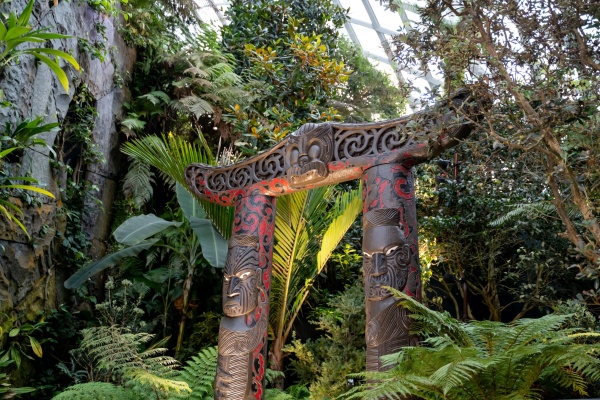
The Māori kūwaha recently unveiled at Gardens by the Bay.
No such thing as a stupid question
A less formal approach to education, with an emphasis on inquiry and collaborative learning, proved an initial challenge for Felix but ended up being one of the reasons he rates his New Zealand education experience so highly.
“At my first class we were told that we were expected to ask questions. This was the first time that I heard the phrase ‘there’s no such thing as a stupid question’,” he says. “That shook me, because in Singapore in those days nobody answered a question in class unless they were sure they had the right answer. For the first time, someone was willing to explore an alternative point of view.”
He turned up to English classes thinking it would simply be language tuition but discovered it was all about writing for your audience, with essays to be critiqued by classmates. “I initially questioned why fellow students would judge my work, but I quickly understood the value in taking on board a diversity of views to refine an idea or get a better product.”
And group project work certainly provided a life lesson for Felix, who had been conditioned to individual success based on exam results. “Not only did we have to work in groups, but we couldn’t choose our project partners,” he says.
“I’ll never forget the lecturer telling us that when we get to the workplace, we cannot choose our boss or even our colleagues, so we need to be able to work with different people. I learned that New Zealanders place people at the centre of what they do, and that we need to learn to appreciate the input of others.”
“I learned that New Zealanders place people at the centre of what they do”
Felix says his New Zealand education set him up for life-long learning which has helped to drive his career success. “You’ve got to learn and unlearn throughout your whole lifetime. It’s not so much about the content, but about being curious and knowing where to go for the answers.”
Friendships lead to enduring ties
It is through the people he met that he has forged an enduring relationship with New Zealand. Fellow churchgoers and schoolmates became life-long friends and “a moral and emotional support base” over the years. He has returned to New Zealand many times and stays in touch with former lecturers and teaching staff, some of whom are now plant suppliers for him in his role at Gardens by the Bay.
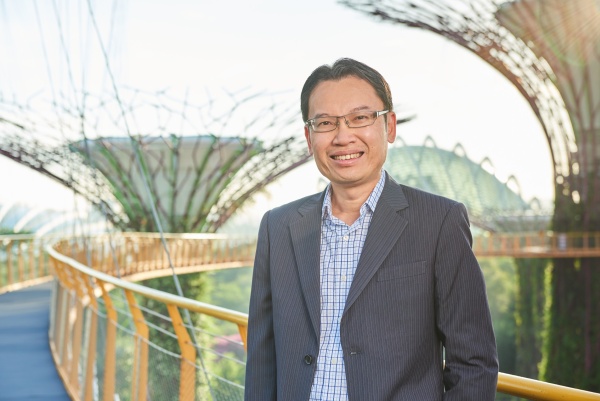
Felix at Gardens by the Bay.
“When I took on this job, one of my first trips was to go back to New Zealand to source new plants for our temperate Flower Dome. I visited a number of nurseries, just knocking on their doors, and I was made to feel so welcome. It just felt like I was at home.”
The world is a very different place from what it was in the 1990s, but Felix says the value of international education remains as important as ever.
“International education helps us to understand other perspectives better and demystify misconceptions we have about each other.
“In today’s uncertain world it is always good to have friends in other places. You discover that we have more things in common than set us apart.”
-
Former international student represents Aotearoa in Ecuador
With his career as an agronomist under way, Juan Pablo came to New Zealand on an MFAT-administered scholarship in 1988, wanting to build on his agricultural qualifications. After taking English courses at Victoria University Wellington Te Herenga Waka, he completed a two-year Diploma in Rural Studies at Massey University Te Kunengaki Pūrehuroa.
His time in New Zealand had such a profound impact on his life that he returned home determined to establish lasting bonds between the two countries. And there is no doubt that his appointment reflects just how much he has achieved.
Juan Pablo says he had dreamed of coming to New Zealand long before he got here. He had read ‘Grass to Milk’, Campbell McMeekan’s 1960s account of New Zealand’s dairying management practices which was well-known among dairy farmers in Ecuador. “I read the book and decided this is the place I want to go.”
Learning from the best
Very few students travelled to New Zealand from Ecuador at that time, most went to the United States for further education, he says. “Many people asked me why I was going to New Zealand, and people still ask me about it today. I tell them I went because I wanted to learn from the best.”
Juan Pablo says he was inspired by his lecturers, especially the late Professor Colin Holmes, a respected researcher, mentor, and advocate of the dairy industry.
“I came from an education system where the teacher held all the knowledge, where it was always black or white. In New Zealand it was totally different because learning was inquiry-based. Critical thinking was the method of developing knowledge.”
He says his experience was transformative on both a personal and professional level.
“The things I saw and learned, the New Zealand way of doing things, and the care and respect people had for each other had a powerful effect on me.”
Over the decades since Juan Pablo’s education experience in Aotearoa, he has built a highly-regarded career in Ecuador, founding and leading primary industry companies, accepting numerous board appointments, representing Ecuador in international free trade agreement negotiations, and being recognised with multiple honours for his contribution to the livestock and dairy sector.
Enduring ties to New Zealand
But he never forgot his ties to New Zealand, working tirelessly to strengthen the bilateral relationship and boost both business and education opportunities. He initially established a company to import agricultural products from New Zealand. When he later secured the role of General Manager of the Cattlemen’s Association, he passed on all his business contacts, and the organisation has been importing electric fencing components and seeds from New Zealand companies ever since.
“In 1988, we brought some cattle in from New Zealand for a breeding programme. Now many farms in Ecuador, including the ones I oversee, have cattle from New Zealand stock. And in the 1990s I helped to establish an education programme with Massey, which saw lecturers come to Ecuador to take short courses in dairy management.”
“When it comes to dairy farming, almost everything I know I learned in New Zealand - pasture management, milk production systems, electric fencing, animal welfare – and farmers have applied these practices successfully in Ecuador,” Juan Pablo says.
“New Zealand is top of mind for every farmer here. When you talk about New Zealand here, everybody knows about its reputation in agriculture. Going to New Zealand is on the wishlist for many people.”
Honoured to represent Aotearoa
Juan Pablo says he was deeply honoured to be asked to be New Zealand’s Honorary Consul in Ecuador, a role which is all about connections and creating opportunities which benefit both countries.
“I am very proud, and I’m happy because I now have the chance to advocate for Aotearoa,” he says. “The better the relationship with New Zealand, the better it is for Ecuador too. We must focus on what we have in common and make the most of it.”
He firmly believes international education is at the heart of relationship-building and collaboration between countries, even more than tourism and business. “You learn the values of a nation through education. Time spent studying in New Zealand will make you a better person.”
“International students will become New Zealand’s ambassadors to the world.”

